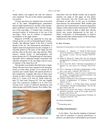Search
for
Sort by
Research
480-510 / 1000+ results
research A Hair-Raising History of Alopecia Areata
The document concludes that understanding and treatments for alopecia areata have significantly advanced, now recognizing it as an autoimmune disorder.

research A Systematic Review of Case Series and Clinical Trials Investigating Regenerative Medicine for the Treatment of Vitiligo
Regenerative medicine is effective and safe for treating vitiligo.

research Pigmented Contact Dermatitis Due to Therapeutic Sensitizer as a Complication of Contact Immunotherapy in Alopecia Areata
Some patients with severe alopecia areata developed skin darkening from their treatment, which may indicate a less effective response to the therapy.

research Electron Paramagnetic Resonance Spectroscopy for Investigating Murine Telogen Skin After Spontaneous or Depilation-Induced Hair Growth
EPR spectroscopy showed that spontaneous hair growth results in thicker skin and less pigmented hair than depilation-induced growth.

research All Roads Lead to the Nucleus: Integration of Signaling, Transcription Factor-Mediated, and Epigenetic Regulatory Mechanisms in the Control of Skin Development and Regeneration
The nucleus is key in controlling skin growth and repair by coordinating signals, gene regulators, and epigenetic changes.

research Dorsal Skin Reactions of Hairless Dogs to Topical Treatment with Corticosteroids
Stronger corticosteroids cause more skin damage in hairless dogs, similar to effects in humans.

research Drug-Induced Skin, Nail, and Hair Disorders
Some drugs can cause skin, nail, and hair problems, which are important for healthcare professionals to recognize and report.

research Correspondence
RAPK is a rare skin disorder with pigmented spots, mainly on hands and feet, starting in youth.

research Gastrointestinal Polyposis with Protein-Losing Enteropathy, Abnormal Skin Pigmentation, and Loss of Hair and Nails (Cronkhite-Canada Syndrome)
Cronkhite-Canada Syndrome often leads to death within 6-18 months.

research Supravenous Repigmentation of Hair Shafts in a Patient with Regrowing Alopecia Totalis: A Case Report and Hypothesis
A woman with alopecia totalis regrew dark hair in bands after using a corticosteroid ointment.

research Hair Changes Caused by Aging
Aging causes hair to gray and thin, with the timing of graying varying by race, and factors like oxidative stress and genetics can lead to hair loss.

research Prevalence, Clinical Characteristics, Possible Etiological and Diagnostic Approach in Dogs with Acral Lick Dermatitis
The study concluded that Acral lick dermatitis is most common in young male Labrador retrievers, often caused by psychological factors, and leads to skin inflammation and stress-related blood changes.

research Cutaneous and Mucosal Lichen Planus: A Comprehensive Review of Clinical Subtypes, Risk Factors, Diagnosis, and Prognosis
Lichen Planus is a less common condition affecting skin and mucous membranes, with various types and associated risk factors, challenging to diagnose, significantly impacts life quality, and may have a risk of cancerous changes in oral lesions.

research Psychoactive Drugs and Skin
Some psychoactive drugs can cause skin reactions, with carbamazepine having a higher risk, and stopping the drug and seeing a dermatologist is important.

research Hair Cosmetic Alterations
The document concludes that individualized treatments for hair issues are effective, certain hair changes can indicate neurocutaneous diseases, specific lotions improve skin health, laser hair removal works but needs more study on long-term effects, men's cosmetics are diverse, peeling is effective but can have side effects, and facial pigmentation is often due to overactive skin cells.

research Hidradenitis Suppurativa/Acne Inversa: An Endocrine Skin Disorder?
Hidradenitis suppurativa may be related to hormones and patients often have metabolic disorders; more research is needed to understand this connection.

research N02. Hair and Nails
Researchers found new hair and nail genes, how hair reacts to UV, differences in white and pigmented hair growth, nerve changes in alopecia, treatments for baldness and alopecia, a toenail condition linked to a genetic disorder, and that nail fungus is more common in people with psoriasis.

research Journal Watch
A test for nail fungus was most accurate with PAS stain, low-dose spironolactone helped two-thirds of acne patients, metformin reduced symptoms of HIV-related fat distribution changes with some side effects, and skin examination with dermoscopy was better at detecting abnormal moles, while temporary tattoos can cause skin reactions.

research Morpho-Regulation of Ectodermal Organs
Modulating BMP activity changes the number, size, shape, and type of ectodermal organs.

research Mucocutaneous Side Effects of Antineoplastic Chemotherapy
Chemotherapy often causes hair loss, nail changes, and mouth issues, but these are usually manageable.

research Recent Advances on Skin-Resident Stem/Progenitor Cell Functions in Skin Regeneration, Aging, and Cancers and Novel Anti-Aging and Cancer Therapies
New treatments targeting skin stem cells show promise for skin repair, anti-aging, and cancer therapy.

research Health Benefits and Safety of Red Pigmented Rice (Oryza Sativa L.): In Vitro, Cellular, and In Vivo Activities for Hair Growth Promoting Treatment
Red pigmented rice, like Sang-Yod rice, could help promote hair growth and prevent hair loss.

research Scalp Hair Repigmentation in the Penumbral Region of Radiotherapy: A Case Series
Radiotherapy can cause rare changes in hair color, which should be discussed with patients.

research Nail Whispers Revealing Dermatological and Systemic Secrets: An Analysis of Nail Disorders Associated With Diverse Dermatological and Systemic Conditions
Nails can reveal important health information about skin and body conditions.

research A Clinical Overview of Hair Removal Using Lasers and Light Sources
Lasers and light sources can effectively remove hair, work best on fair skin with dark hair, and usually need multiple treatments.
research Keratinocyte Stem Cells: Role in Aging
Aging reduces skin stem cell function, leading to changes like hair loss and slower wound healing.

research Adverse Cutaneous Reactions to Chemotherapeutic Agents and Cytokine Therapy
Chemotherapy and cytokine therapy can cause various skin reactions, including hair loss and hypersensitivity.

research Effect of Intense Pulsed Light Treatment on Human Skin In Vitro: Analysis of Immediate Effects on Dermal Papillae and Hair Follicle Stem Cells
Intense pulsed light treatment mainly damages pigmented hair parts but spares stem cells, allowing hair to regrow.

research A Clinical Study of Mucocutaneous Manifestations of HIV
Most HIV patients in the study showed skin and mucous membrane issues, with oral thrush being the most common.